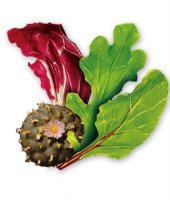
Thursday, August 24, 2006
The Daily Hump: Tripping on Salad
 I was waiting in line at the salad bar yesterday when a very conservatively dressed woman in front of me ordered the "mescaline greens." It was obvious what she meant as she was pointing to the mesclun. That got me thinking; do mescaline and mesclun share a common etymology? Upon returning to the office I began my research. Mesclun is related to the Provençal mesclom, mesclumo meaning mixture. These words harken back to the Latin verb misculāre, to mix thoroughly. Interestingly, the word meddle also stems from the Latin misculāre. Thus, meddle and mesclun are sort of linguistic cousins.
I was waiting in line at the salad bar yesterday when a very conservatively dressed woman in front of me ordered the "mescaline greens." It was obvious what she meant as she was pointing to the mesclun. That got me thinking; do mescaline and mesclun share a common etymology? Upon returning to the office I began my research. Mesclun is related to the Provençal mesclom, mesclumo meaning mixture. These words harken back to the Latin verb misculāre, to mix thoroughly. Interestingly, the word meddle also stems from the Latin misculāre. Thus, meddle and mesclun are sort of linguistic cousins. But I'm getting off topic; what about mescaline? Mescaline has been used for centuries in Native American religious ceremonies, most notably by the Huichols of Mexico and The Doors of LA. The actual chemical that causes the notorious hallucinations was first extracted in 1897 by a German, Arthur Heffter. Thus, not surprisingly, the word mescaline has both American Spanish (mescal) and German (-in) roots. The root, mescal, made it into English on its own as an accepted name for the peyote button that contains the chemical mescaline. It is also a synonym for maguey, which is any of various American plants of the genus Agave, especially the century plant. Finally, mescal can also be the liquor or food created by preparing certain agaves. And, we find, mescal's etymology is rooted in this liquor and food sense: American Spanish, from Nahuatl mexcalli, mescal liquor : metl, maguey plant + perhaps ixca, xca, to bake.
But I'm getting off topic; what about mescaline? Mescaline has been used for centuries in Native American religious ceremonies, most notably by the Huichols of Mexico and The Doors of LA. The actual chemical that causes the notorious hallucinations was first extracted in 1897 by a German, Arthur Heffter. Thus, not surprisingly, the word mescaline has both American Spanish (mescal) and German (-in) roots. The root, mescal, made it into English on its own as an accepted name for the peyote button that contains the chemical mescaline. It is also a synonym for maguey, which is any of various American plants of the genus Agave, especially the century plant. Finally, mescal can also be the liquor or food created by preparing certain agaves. And, we find, mescal's etymology is rooted in this liquor and food sense: American Spanish, from Nahuatl mexcalli, mescal liquor : metl, maguey plant + perhaps ixca, xca, to bake.So, there you have it: mesclun and mescaline do not share a common etymology, and although you're unlikely to find mescaline at your salad bar there's nothing that says mescal may not be a tasty addition to your mesclun.
Mescaline [Wikipedia]
Mesclun [The American Heritage® Dictionary of the English Language, Fourth Edition]
Labels: German, Latin, Nahuatl, Spanish, The Daily Hump
:: posted by David, 8:32 AM